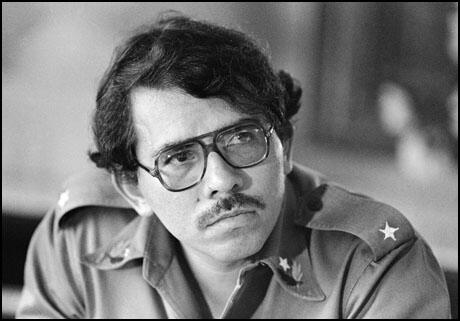Daniel Ortega
Daniel Ortega, was born in La Libertad, Nicaragua, in 1946. Both his parents were staunch opponents of the dictatorship of Anastasio Somoza and had suffered periods of imprisonment. As a young man his hero was Augusto Sandino, a guerrilla leader murdered by Somoza.
In 1963 Ortega joined the Sandinista National Liberation Front (FSLN). Ortega eventually became head of the urban resistance but he was arrested and imprisoned in 1967.
On 27th December, 1974, a group of FSLN guerrillas seized the home of a government official and kidnapped a group of important figures close to Anastasio Somoza. These men were later exchanged for Ortega and thirteen other Sandinista prisoners who were flown to Cuba.
The FSLN's prestige increased after this successful operation. In 1975 Anastasio Somoza Debayle ordered a violent and repressive campaign against the FSLN. It killed a large number of guerrillas including one of its founders, José Carlos Fonseca Amador.
Anastasio Somoza Debayle's regime received a set-back with the election of President Jimmy Carter in the United States. Carter announced he was only willing to provide aid to the government of Nicaragua if it improved its human rights record.

On 10th January, 1978, Pedro Joaquín Chamorro Cardenal, the publisher of the La Prensa newspaper and a strong opponent of the government, was assassinated. Evidence was uncovered that the publisher had been killed by Somoza's son and members of the National Guard. On 23rd January a nationwide strike began and the workers demanded an end to the military dictatorship.
In November 1978 the Organization of American States on Human Rights published a report charging the National Guard with numerous violations of human rights. The report was followed by a United Nations resolution condemning the Nicaraguan government.
Anastasio Somoza Debayle refused to leave office and various organizations, including the Sandinista National Liberation Front, Los Doce, the PLI, and the Popular Social Christian Party formed the National Patriotic Front. In June a provisional government in exile was established in Costa Rica. The FSLN continued its guerrilla activities and it gradually gained control of most of Nicaragua.
On 17th July, 1979, Anastasio Somoza Debayle resigned and fled to Paraguay. Ortega joined the Junta for National Reconstruction and in 1984 FSLN won the elections. The following year Ortega became president of Nicaragua.
Funded by the United States, the Contra rebels refused to accept the election of Ortega. His government's power also suffered from economic sanctions imposed by President Ronald Reagan. It was later discovered that the United States had attempted to damage the economy by the mining of Nicaragua's harbours.
In the 1990 elections the FSLN lost the elections to the UNO (Union of National Opposition). Ortega was replaced as president by Violeta Chamorro. Ortega left office with the words: "We leave victorious because we Sandinistas have spilled blood and sweat not to cling to government posts, but to bring Latin America a little dignity, a little social justice."
Ortega and his FSLN also lost the elections in 1996 and 2001.

